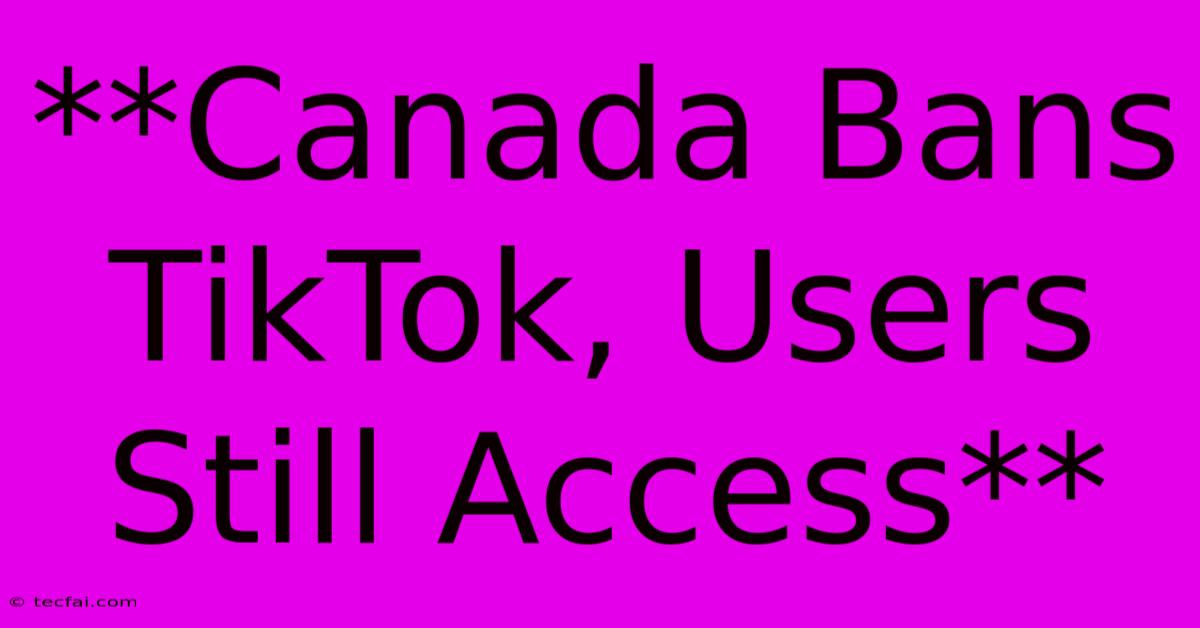**Canada Bans TikTok, Users Still Access**

Discover more detailed and exciting information on our website. Click the link below to start your adventure: Visit Best Website tecfai.com. Don't miss out!
Table of Contents
Canada Bans TikTok, Users Still Access: Is the Ban Effective?
In a move that sent ripples through the digital world, Canada has joined the growing list of countries banning TikTok from government devices. This decision, announced in February 2023, is driven by concerns about data security and potential Chinese government influence. While the ban prohibits government employees from accessing the popular app on official devices, it doesn't stop Canadians from using TikTok on their personal phones.
The Rationale Behind the Ban
The Canadian government's decision stems from a growing global concern regarding TikTok's data security and potential ties to the Chinese government. The app, owned by ByteDance, is a popular platform for short-form videos, but its data collection practices and potential for misuse have raised red flags.
Concerns Around Data Security
The primary concern revolves around TikTok's data handling practices. Critics argue that the app could potentially transfer user data to the Chinese government, raising privacy concerns. The government's decision is a proactive measure to protect sensitive information from potential access by foreign entities.
The Impact of the Ban
While the ban applies only to government devices, its impact extends beyond the government sphere. The decision has triggered a wider discussion about the security of popular social media platforms and the potential influence of foreign powers. It also highlights the growing scrutiny of data privacy issues in the digital age.
Is the Ban Effective?
The effectiveness of the ban is debatable. While it restricts government employees from using TikTok on work devices, it doesn't prevent Canadians from accessing the app on their personal phones. The ban primarily serves as a symbolic gesture, emphasizing the government's commitment to data security and its willingness to take action against potential risks.
Alternative Solutions
Instead of outright bans, some experts advocate for alternative solutions such as stricter regulations on data collection practices and increased transparency from social media platforms. This approach aims to address security concerns without resorting to complete censorship.
The Future of TikTok
The Canadian ban on TikTok is part of a global trend of increasing scrutiny and regulation of social media platforms. As technology evolves, governments and policymakers continue to grapple with the evolving landscape of data security and privacy. The future of TikTok and other social media platforms depends on how effectively these issues are addressed.
Conclusion
The Canadian ban on TikTok, while impactful, doesn't necessarily offer a definitive solution to the broader concerns about data security and foreign influence. The decision raises important questions about the balance between national security and individual freedoms in the digital age. As the world navigates the complexities of online data and privacy, it's crucial to find sustainable solutions that safeguard both individual rights and national interests.

Thank you for visiting our website wich cover about **Canada Bans TikTok, Users Still Access** . We hope the information provided has been useful to you. Feel free to contact us if you have any questions or need further assistance. See you next time and dont miss to bookmark.
Featured Posts
-
San Francisco Mayoral Race Remains Tight
Nov 07, 2024
-
Sf Mayor Election Current Vote Results
Nov 07, 2024
-
Corks Perry Street Market Cafe Shuts Down
Nov 07, 2024
-
Grand View University 2024 25 Tuition Costs
Nov 07, 2024
-
Christy Brown Self Portrait Literary Analysis
Nov 07, 2024
